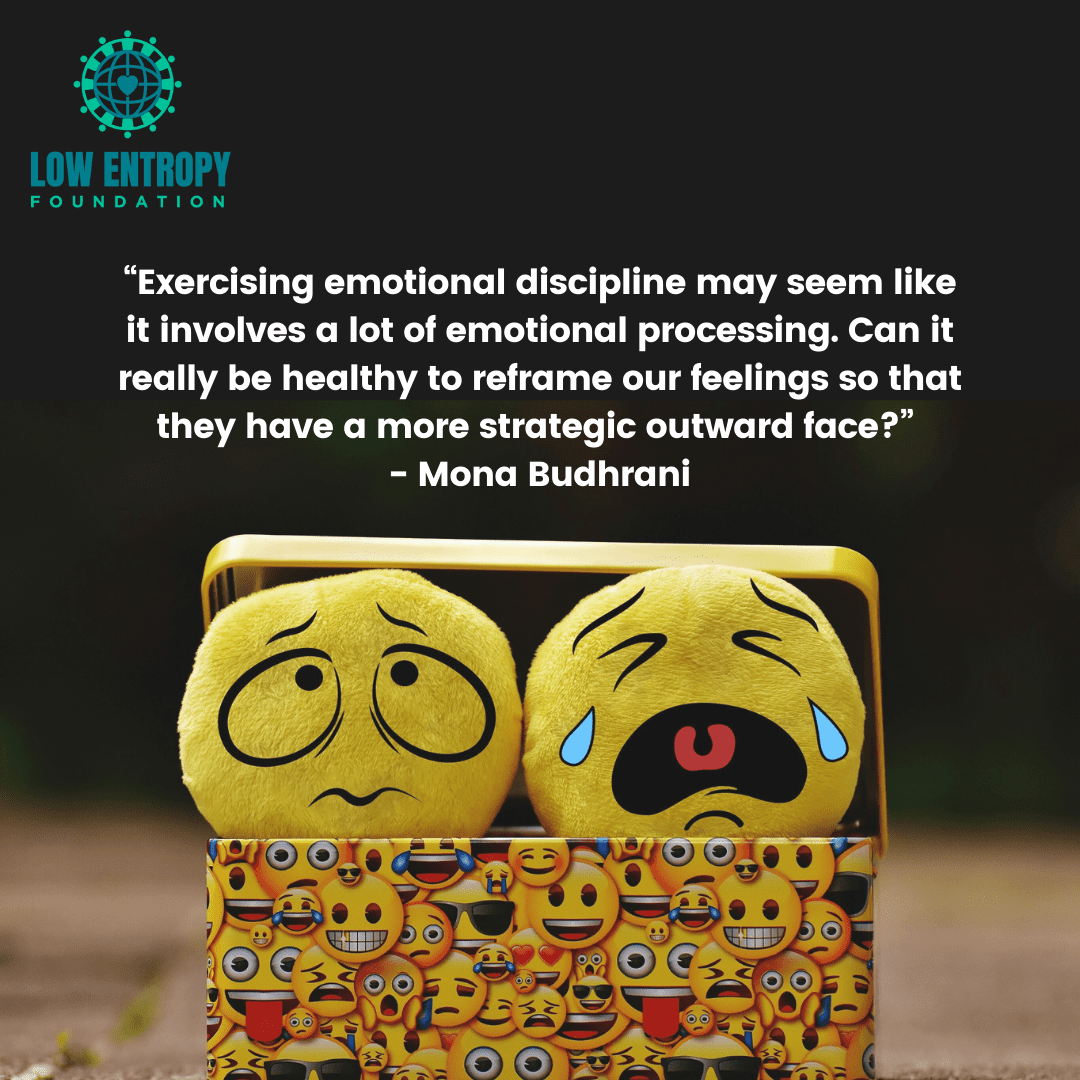Emotions are so often associated with a lack of control, so often conceived as internal phenomena that grip and compel people with their power. But Low Entropy Volunteer Writer Mona Budhrani explains why you might want to control your feelings, and how you can go about doing it.
Feelings are strong forces, and we have the power to choose how we feel.
It’s important to be aware of our emotions and not suppress them, as they represent our true selves. But our emotions and energy can land us in conflict or set us on a destructive path if we do not channel them. The ability to choose how we feel is emotional discipline, which – like any other habit – is difficult to cultivate.
With different life experiences, we all differ in the array of things that trigger our emotions. For some, a threat or a war is especially upsetting, for others, the loss of a job. Many of us are set off by interpersonal conflict, with a colleague or spouse, for instance.
Emotional discipline is not a one-size-fits-all process. Rather, we can develop and customize it to our own needs. It builds our capacity to deal with current and future challenges.
It teaches us to not do what we might impulsively want to do or say what we impulsively want to say. It teaches us to not react in anger, even when we might have justification to do so. With emotional discipline, you don’t do things only when you feel like it – rather, you schedule tasks so they’re completed at the right time.
Together with emotional intelligence, emotional discipline is also about understanding our own emotions and strategizing according to that awareness. These inward dimensions of EQ, self-awareness and emotional discipline can seed personal and professional success.
It’s understandable to feel stressed, mad, frustrated, disappointed or worried. But rather than indulging these raw emotions, it’s a sounder strategy to work through these feelings and reframe them in a way that furthers our resolutions.
To be emotionally disciplined means recognizing how to handle different emotions at certain times. For instance, receiving critical feedback may be upsetting, but it is important to know that it may not serve you well to respond in an angry manner (e.g. become defensive, storm off or cry). Emotional discipline allows us to respond appropriately to each setting and audience, and to make the impression we wish to make.
The question we might ask is, is this really healthy?
Exercising emotional discipline may seem like it involves a lot of emotional processing. Can it really be healthy to reframe our feelings so that they have a more strategic outward face? Having access to your emotions allows you to engage with them in a healthy way. If we deny them, they may eventually bubble to the surface in an unhelpful way (e.g. angry outbursts). However, it is vital that we know when, and with whom, to share them.
For instance, regular conversations about personal life and workplace challenges with trusted members of your inner circle, including mentors and friends, can help defuse tension, so the stress doesn’t mount. The key here is to explore and understand our feelings, and to do this work at times that suit us. Having an emotional outburst doesn’t make anyone seem sincere or well-grounded.
Sometimes individuals say that they don’t want to be “fake,” and therefore must wear their emotions on their sleeves. But let’s recognize the possible consequences of this authenticity and how they may affect our lives, be it in our personal relationships or at work.
How do we become more emotionally disciplined? Step one is to work toward a deeper understanding of yourself. How do we feel – are we happy? Are we fulfilled?
Using techniques such as meditation, mindfulness and controlled breathing can help manage difficult emotions when we are in situations that can trigger them.
Also, being able to anticipate these emotions is a useful way to prepare for your response to them. Emotionally disciplined people look for solutions, rather than dwelling on their circumstances. Focus on the positive, and you will win the game!
Tell us about a time when emotional discipline paid off for you – share your story in the comments below, at a Conscious Connections meeting, or on our Low Entropy Community social network!


Beautiful written. I felt so connected to this. Thanks for sharing 🙂